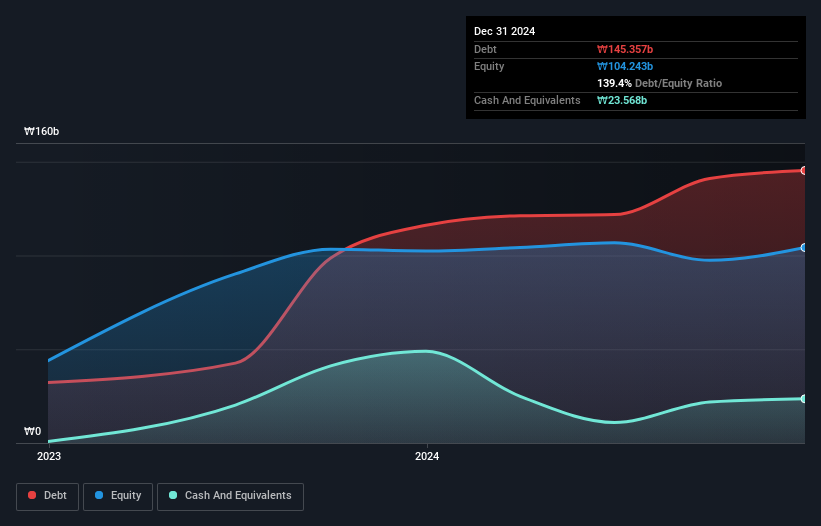Howard Marks put it nicely when he said that, rather than worrying about share price volatility, 'The possibility of permanent loss is the risk I worry about... and every practical investor I know worries about.' So it might be obvious that you need to consider debt, when you think about how risky any given stock is, because too much debt can sink a company. We can see that Samkee EV Corp. (KOSDAQ:419050) does use debt in its business. But should shareholders be worried about its use of debt?
When Is Debt A Problem?
Debt and other liabilities become risky for a business when it cannot easily fulfill those obligations, either with free cash flow or by raising capital at an attractive price. Part and parcel of capitalism is the process of 'creative destruction' where failed businesses are mercilessly liquidated by their bankers. While that is not too common, we often do see indebted companies permanently diluting shareholders because lenders force them to raise capital at a distressed price. Having said that, the most common situation is where a company manages its debt reasonably well - and to its own advantage. The first step when considering a company's debt levels is to consider its cash and debt together.
What Is Samkee EV's Net Debt?
You can click the graphic below for the historical numbers, but it shows that as of December 2024 Samkee EV had ₩145.4b of debt, an increase on ₩116.1b, over one year. However, it also had ₩23.6b in cash, and so its net debt is ₩121.8b.

How Healthy Is Samkee EV's Balance Sheet?
The latest balance sheet data shows that Samkee EV had liabilities of ₩86.1b due within a year, and liabilities of ₩97.8b falling due after that. On the other hand, it had cash of ₩23.6b and ₩37.3b worth of receivables due within a year. So its liabilities outweigh the sum of its cash and (near-term) receivables by ₩123.0b.
Given this deficit is actually higher than the company's market capitalization of ₩84.9b, we think shareholders really should watch Samkee EV's debt levels, like a parent watching their child ride a bike for the first time. In the scenario where the company had to clean up its balance sheet quickly, it seems likely shareholders would suffer extensive dilution. There's no doubt that we learn most about debt from the balance sheet. But it is Samkee EV's earnings that will influence how the balance sheet holds up in the future. So if you're keen to discover more about its earnings, it might be worth checking out this graph of its long term earnings trend .
Check out our latest analysis for Samkee EV
In the last year Samkee EV wasn't profitable at an EBIT level, but managed to grow its revenue by 8.6%, to ₩99b. We usually like to see faster growth from unprofitable companies, but each to their own.
Caveat Emptor
Over the last twelve months Samkee EV produced an earnings before interest and tax (EBIT) loss. To be specific the EBIT loss came in at ₩6.3b. Considering that alongside the liabilities mentioned above make us nervous about the company. It would need to improve its operations quickly for us to be interested in it. Not least because it had negative free cash flow of ₩36b over the last twelve months. That means it's on the risky side of things. The balance sheet is clearly the area to focus on when you are analysing debt. However, not all investment risk resides within the balance sheet - far from it. These risks can be hard to spot. Every company has them, and we've spotted 2 warning signs for Samkee EV (of which 1 makes us a bit uncomfortable!) you should know about.
Of course, if you're the type of investor who prefers buying stocks without the burden of debt, then don't hesitate to discover our exclusive list of net cash growth stocks, today.
New: Manage All Your Stock Portfolios in One Place
We've created the ultimate portfolio companion for stock investors, and it's free.
• Connect an unlimited number of Portfolios and see your total in one currency
• Be alerted to new Warning Signs or Risks via email or mobile
• Track the Fair Value of your stocks
Have feedback on this article? Concerned about the content? Get in touch with us directly. Alternatively, email editorial-team (at) simplywallst.com.
This article by Simply Wall St is general in nature. We provide commentary based on historical data and analyst forecasts only using an unbiased methodology and our articles are not intended to be financial advice. It does not constitute a recommendation to buy or sell any stock, and does not take account of your objectives, or your financial situation. We aim to bring you long-term focused analysis driven by fundamental data. Note that our analysis may not factor in the latest price-sensitive company announcements or qualitative material. Simply Wall St has no position in any stocks mentioned.
About KOSDAQ:A419050
Samkee Energy Solutions
An aluminum die-casting company, manufactures and sells automobile parts and accessories in South Korea.
High growth potential with low risk.
Market Insights
Community Narratives



